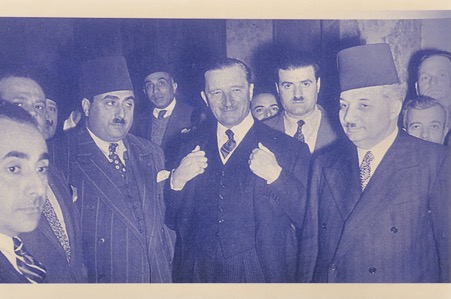- Posted on : April 13, 2013
- Posted by : Tom Fletcher
As a Brit in the Levant, you can never go far without being reminded of history, and our role in it. At this week’s Lebanese Army conference, the moderator spoke of ‘the British habit of interventions in the Middle East’. I countered that this was a relatively recent phenomenon – others had been at it far longer than our 1000 years or so. At the same event I was told, not for the first time, that it was all the fault of the way Sykes and Picot drew the borders of the region’s 20th century states – as Tom Friedman writes, take away their map and the Syria crisis is easier to understand. When I visit Palestinian refugees, I hear that their – distressing – situation is all the fault of Balfour.
Sykes, Picot, Balfour. These are names known to most schoolchildren in the Middle East, but few in the West. Their legacies are significant, controversial and contested. It would take a book rather than a blogpost to consider them properly.
In the last few days however, I’ve been reminded of five other fascinating moments in our recent history in the region.
1. John McArthy of the BBC, who of course has his own Lebanon history, was here researching what we think was the last Royal Visit, by Prince Albert in 1862, a sort of glorified gap year. Just as last month Samantha Cameron met refugees from the Syria crisis, the Prince shared a camp in the British Consul’s garden with refugees from the 1860 civil war, and what we would now call international peacekeepers. I’m on my way to Belfast with Walid Joumblatt, conscious of the way that the views of some in Lebanon are still shaped by British actions – my predecessor ran guns to one side – during that 1860 war.
2. A week ago, I was re-living the dream of many English schoolboys, camping in Wadi Rum, from where TE Lawrence supported the 1917 Arab revolt against the city of Aqaba.
3. We’re preparing for Remembrance Services for the British soldiers who died – alongside Australian, Palestinian, free French and other allies – in liberating Lebanon from Vichy France in 1941.
4. We had James Barr here, author of a book about the extraordinary Edward Spears, who as Churchill’s Minister to Lebanon and Syria played a key part in delivering free elections and independence in 1943, an anniversary Lebanon will mark in November.
5. To mark the passing of Margaret Thatcher, we released locally her 1982 letters to President Reagan and President Sarkis, expressing ‘total condemnation’ (more characteristically tough language I imagine than the FCO drafts) of the Israeli invasion of that year, and an iron-clad commitment to Lebanon’s sovereignty and stability.
All this history matters hugely. Freedom is a common theme. Yet some interlocutors (see lively exchanges on previous blogposts ) can’t see past the past when it comes to the Brits. So for all that we talk of the Britain of Beckham, Prince William and London 2012, they see the ghosts of Balfour, Prince Bertie and London 1192.
One of the most important projects in contemporary Lebanon is the effort to write a shared version of the events that shaped the nation. We have to be as honest as possible about our role in that history, but not be trapped by it; conscious of it but not constrained by it. We should not give lectures, but neither should we take them from countries that still manipulate Lebanon for their own interests, or from those who want to use us as the excuse. After all, if we were as good at conspiracy as some claim, we would still have an Empire.
The key to Lebanon’s future lies not in arguing over whether it is all the fault of the Canaanites or Mamluks, Crusaders or Israelites, Ottomans, colonialists, Persians or others, fascinating as that debate can be. The key lies in shaping the conditions for the 70th anniversary of Lebanese independence to be the first year of meaningful Lebanese freedom. A year when already, perhaps for the first time in a generation, we have a PM selected without reference to Damascus. Our external interference should continue to be to give Lady T’s ‘ironclad support to Lebanon’s sovereignty’. I read recently that there is an international conspiracy to keep Lebanon stable – count me in for that one.
It is not just about the last Sykes and Picot, but the next ones. And they should have Arabic names.

